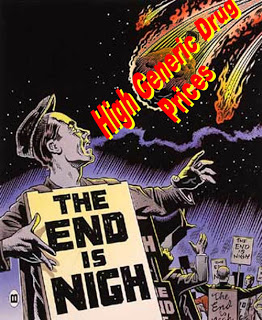Some people think “Judgment Day” will come tomorrow, May 21, 2011, at 2 a.m. Eastern Daylight Time at which time will begin the “rapture” where “all the graves will be opened and all of the dead bodies will come out” and only the true believers will be saved.
I don’t believe in that particular fantasy, but I do believe the end is near for so-called low cost generic drugs.
Several recent signs suggest that the stars are aligned against low cost generic drugs. Here’s my summary of these signs.
For quite some time we’ve heard about “Big Pharma’s Record Drug Shortages” (see “The nation is facing an unprecedented drug shortage” and “What’s Behind Big Pharma’s Record Drug Shortages?“). Shortages might be caused by “too many mergers and acquisitions” that have reduced the number of suppliers.
Those stories put the blame on “Big Pharma,” by which they mean brand name drug manufacturers. However, lost in the copy is the FACT that “almost all the shortages are generic drugs.”
The second sign was reported by Jim Edwards over at bnet in his post “4 Pharma CEOs Admit They Jack Up Drug Prices for the Hell of It.”
Edwards quotes David Snow, chief executive officer at Medco Health Solutions: “As their branded drugs approach the patent cliff, there has always been the tendency to see increased pricing toward the end, just to get the last dollar out of every drug before they lose brand protection.”
Yet an NPR article titled “Big Pharma’s Golden Age Leads To Generics Windfall” suggests the “wave” of drugs going generic “can save consumers plenty of dough.”
That would be true if generic drug companies as well as brand drug companies were not jacking up prices “for the hell of it.” Actually, prices are jacked up because there is a shortage, which can be artificially produced if there is a drug industry consolidation, which there seems to be in both the generic and brand name industries.
I’ve heard that the price of generics has NEVER been as low as some people believe even in times where there were no shortages. Actually, the prices of some generics can be as much as 80% of the equivalent brand name drug. Why is that? I mean generic drug companies have practically NO marketing budgets, which have been blamed for high brand name drug prices by pharma critics. You’d think that without the marketing and associated overhead expenses, generic drugs would be dirt cheap!
The fact is, “three-quarters of prescriptions these days are filled with a generic,” points out NPR. “And the proportion keeps climbing.” That means that generic drug companies have almost “cornered the market” (for small molecule drugs) and can charge what that market will bear (in the U.S., that is, where there are no price controls).
And soon the generic drug industry will “corner” the biologic drug market as well.
“Should the market develop according to plan,” notes a WSJ article, “copies of these complex drugs [biologics] alone could make up around 50% of the expected $10 billion biosimilars market by 2016, according to data compiled by Capgemini Consulting” (see “Generics Companies Weigh In on Biological Drugs“).
As biologics vie for the market to replace small-molecule pills, the situation will even be worse. As a commenter to the NPR article stated “Makers of brand-name biologics are spending big money to delay biosimilars coming onto the market, so even tho biologics like Enbrel, that goes off patent next year — without the availability of a “biosimilar” – the cost of Enbrel will still be $1,500 a month.”
The generics rapture is upon us! Save yourself!









![6 Digital Tools at the Center of Healthcare Digitalization [INFOGRAPHIC]](http://ec2-54-175-84-28.compute-1.amazonaws.com/pharma-mkting.com/wp-content/uploads/2021/04/6DigitalTools_600px-100x70.jpg)




